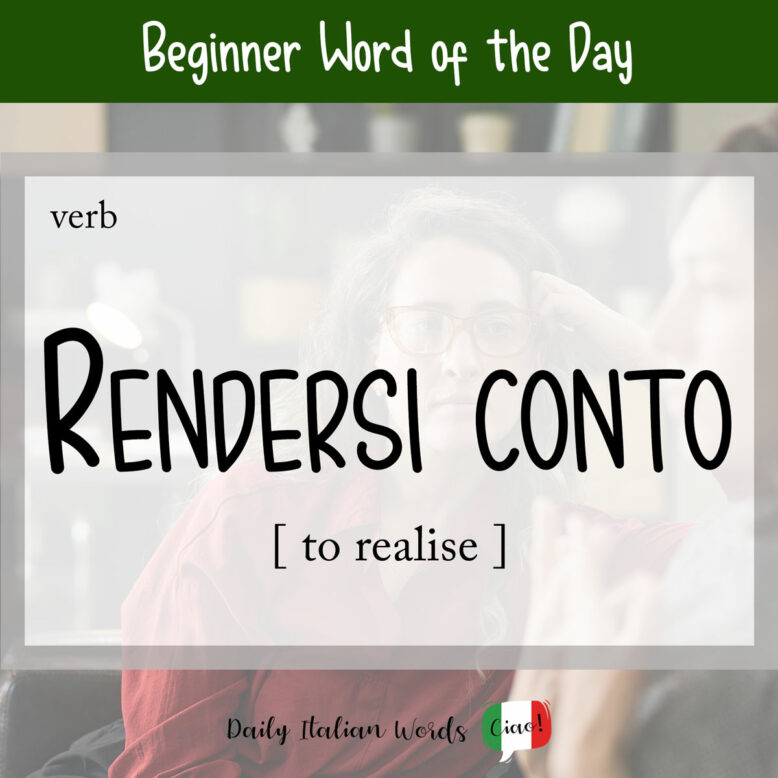If you want to say “to realise” in Italian, it is possible to use the cognate realizzare, but if your aim is to sound like a true native, why not try dropping the odd “rendersi conto” into your exchanges as well?

Rendersi conto is made up of:
- the verb rendere which means to render or to give back amongst other things
- the pronominal particle si
- conto which has numerous meanings but in this case best translates as account or explanation
In order to make a sentence with this verb phrase, you must first conjugate rendersi, which has a regular -ere conjugation in the present tense, and then add on the word conto. Let’s take a look at how it conjugates in the present indicative and present perfect tenses:
Present indicative:
io mi rendo conto
I realise
tu ti rendi conto
you realise
(informal, singular)
lui si rende conto
he realises
lei si rende conto
she realises
Lei si rende conto
you realise
(formal, singular)
noi ci rendiamo conto
we realise
voi vi rendete conto
you realise (plural)
loro si rendono conto
they realise
Present perfect:
io mi sono reso conto (m.)
io mi sono resa conto (f.)
I (have) realised
tu ti sei reso conto (m.)
tu ti sei resa conto (f.)
you (have) realised
(singular, informal)
lui si è reso conto
he (has) realised
lei si è resa conto
she (has) realised
Lei si è reso conto (m.)
Lei si è resa conto (f.)
you (have) realised
(singular, formal)
noi ci siamo resi conto (m.)
noi ci siamo rese conto (f.)
we (have) realised
voi vi siete resi conto (m.)
voi vi siete rese conto (f.)
you (have) realised (plural)
loro si sono resi conto (m.)
loro si sono rese conto (f.)
they (have) realised
In order to connect rendersi conto to the rest of the sentence, it is necessary to use the Italian prepositions di or che, both of which translate as that in this case.
If rendersi conto and the verb that follows have the same subject, you can use either di or che. Note that di can only be used with the past or present tense.
rendersi conto di + infinitive verb (present or past)
Mi rendo conto di aver fatto un errore.
(Io mi rendo conto + io ho fatto un errore)
I realise I’ve made a mistake.
rendersi conto che + same subject + conjugated verb (any tense)
Mi rendo conto che ho fatto un errore.
(Io mi rendo conto + io ho fatto un errore)
I realise I’ve made a mistake.

Rendersi conto + di can also be used when the subordinate clause begins with words such as che cosa (what), come (how), cosa (what) and so on. In this case, the subjunctive form of the verb is required.
Mi rendo conto di come sia prezioso il tempo.
(The verb ‘essere‘ becomes subjunctive ‘sia‘ instead of ‘è‘.)
I realise how precious time is.
If rendersi conto and the following verb have different subjects, then the construction becomes:
rendersi conto che + different subject + conjugated verb (any tense)
Mi rendo conto che Elena non sarà mai felice in quella casa.
I realise that Elena will never be happy in that house.
Le ragazze non si rendono conto che la situazione sta peggiorando.
The girls don’t realise that the situation is getting worse.
Did you know that…?
A common exclamation is Ma (tu) ti rendi conto!? which is the Italian equivalent of Can you believe it!? in English.

Before concluding, it’s worth noting that the expressions rendersi conto and rendere conto (without the particle si) mean two completely different things. The latter generally translates as “to be accountable” or “to account for“.
Non devo rendere conto di niente a nessuno.
I’m not accountable to anyone for anything.
Heather Broster is a graduate with honours in linguistics from the University of Western Ontario. She is an aspiring polyglot, proficient in English and Italian, as well as Japanese, Welsh, and French to varying degrees of fluency. Originally from Toronto, Heather has resided in various countries, notably Italy for a period of six years. Her primary focus lies in the fields of language acquisition, education, and bilingual instruction.


